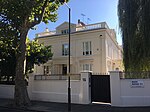Maida Vale Hospital for Nervous Diseases
1867 establishments in England1993 disestablishments in EnglandDefunct hospitals in LondonHospitals established in 1867London building and structure stubs ... and 1 more
United Kingdom hospital stubs

The Maida Vale Hospital for Nervous Diseases was a hospital that existed from 1867 to 1993.Y
Excerpt from the Wikipedia article Maida Vale Hospital for Nervous Diseases (License: CC BY-SA 3.0, Authors, Images).Maida Vale Hospital for Nervous Diseases
Randolph Avenue, London St. John's Wood
Geographical coordinates (GPS) Address Nearby Places Show on map
Geographical coordinates (GPS)
| Latitude | Longitude |
|---|---|
| N 51.5262 ° | E -0.1807 ° |
Address
Randolph Avenue 50
W9 1BE London, St. John's Wood
England, United Kingdom
Open on Google Maps










